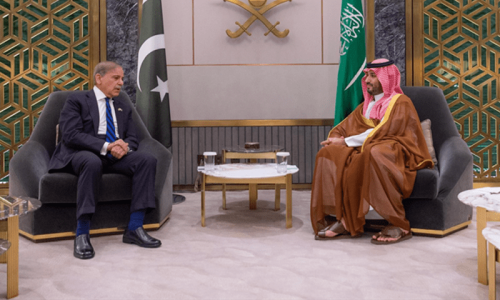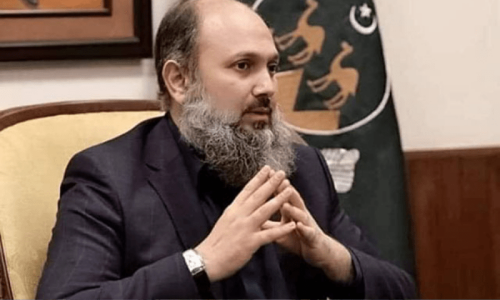THE deadly blast in Iran's Sistan province, bordering Pakistan, last October 17 has just added another gory dimension to the saga of mayhem and murder already engulfing Pakistan and Afghanistan. The wave of terror has reached the shores of Iran, a relative island of tranquility until now.
It's an open secret that Iran has long been in the cross-hairs of those who would like to redraw the map of the region around Iran and Pakistan. They have developed enormous stakes in it, especially since the occupation of Iraq. Ace investigative journalist, Seymour Hersch, reported in The New Yorker, last year in spring, about the elite Special Services Group (SSG) sleuths and saboteurs being active inside Iran for quite sometime. SSG at that time was led by General Stanley McChrystal, since anointed by President Obama to bail him out of the Afghan cul de sac.
Washington has both long- term and short- term interests vested in Iran and these two have been running in parallel.
The long-term interest is to ensure that Iran doesn't have nuclear power to threaten Israeli and American stakes—in that order, precisely—in the region. The short-term interest dictates, per se, that in order to guarantee the realisation of the long-term objective there should be a non-hostile regime—the euphemism for a caged ruling elite—in Tehran. It irks Washington enormously that the only piece missing on the chess-board it has been trying so hard to arrange for the region is Iran, which refuses to be boxed in.
This looks all the more jarring to Washington's chess masters that a defiant Tehran continues to play 'catch-me-if-you-can' with them against the backdrop of a subdued Iraq, an
Afghanistan half in the bag, half still outside of it, and a Pakistan whose surrender can be taken for granted; it has never been more than a phone-call-away.
So much as some well-heeled Washington votaries—moles strategically ensconced in vantage places inside Pakistan as well as among the Pakistani diaspora abroad—may jump to their feet to pooh-pooh any suggestion of a conspiracy theory, a tactical nexus between elite American operatives inside Iran and Jundallah, the Baluch front that carried out the dastardly Sistan operation, can't be ruled out. The abject failure of a foreign-sponsored scheme to stir a popular uprising against the regime—following Ahmedinejad's re-election as president—the temptation to try another tack may have become hard to resist.
The Baluchs have been in violent ferment on the Pakistani side of the border for long. On the Iranian side the Baluch restiveness has been comparatively low-keyed. But one shouldn't overlook the fact that a similar bomb blast, on a smaller scale, greeted Ahmedinejad in Zahidan, close to the border with Pakistan, during his campaign for re-election. That it didn't light a fire under his feet, the next best option to give his government a rude jolt could only be to stir the Baluchi pot in Iran a little more vigorously. Interestingly, it was perpetrated only a day before Iran entered into crucial talks in Vienna with IAEA to thrash out the nuances of its voluntary offer to have its enriched Uranium further processed in Russia for use in medical isotopes. Those talks are making good progress.
But the Iranian leadership, ever so sensitive to criticism much less active opposition, hasn't done itself any proud by coming out instantly firing at all cylinders against Pakistan. Roping Pakistan into the rogues' gallery, along with more plausible suspects, just because the leader of Jundallah, one Abdul Malik Rigi, is said to be based in Pakistan was a knee-jerk reaction. It could only be symptomatic of the Iranian leaders' fear of encirclement. But while it's worth a sympathetic evaluation, it still doesn't give them a license to beat everyone with the same stick. Pakistan, after all, is such an old and trusted neighbour of Iran and deserves to be treated separately from those whose animus toward Iran is so well known and proven time and again.
However, it doesn't mitigate the tragedy Pakistan has invited upon itself. This should be a moment of somber introspection and reflection that a neighbour as old and close as Iran has had reason to point the finger, instantly, at Pakistan for complicity in the mayhem of Sistan, largely because of the common perception that it has become a kingpin in the American agenda for the region, of which Iran is a principal target.
Of course Pakistan has a sound brief of its own to argue back that it's now being made to pay the heaviest price of the horrid chaos buffeting the region as a whole. It's Pakistan fighting a deadly and costly war, in terms of resources and numbers, to make sure that the low-intensity war in next-door Afghanistan doesn't flare up into a full-blown civil war on the Pakistani soil to challenge the existence of the state. Pakistan is guilty, no doubt, of having blindly taken on the role of a frontline American ally in the war against Afghanistan—a lethal legacy of that tin-pot dictator who's now masquerading as a statesman of sorts to line his pockets with money doled out to him at stage-managed 'lectures' at American universities and 'think-tanks' (what an oxymoron).
Whether Pakistan's alibi soothes Iran's frayed nerves and puts them at rest is beside the point. What has far greater urgency and priority for the Pakistanis is to grapple with the fallout from a war that wasn't Pakistan's, in the first place, but has become one under the train of circumstances triggered by Musharraf's sell-out to US interests and agenda in the region.
Pakistan is now reaping a deadly harvest of the seeds sown on the morning after Musharraf cast the die for a subservient Pakistan, all by himself at the cost of 170 million Pakistanis. The chickens are coming home to roost violently, without doubt, when the dare-devils of the Taliban can attack GHQ in broad daylight, or assault the precincts of the Islamic University in Islamabad with impunity. The obvious inference is that the high and the mighty lords (or robber-barons?) ensconced in Islamabad's power corridors have not yet had any inkling of what an enormous burden they have taken upon themselves, and are proving thoroughly incapable of coping with it.
By the same token, have we apprised ourselves of what's at stake in the latest, large-scale, military offensive involving 30,000 troops begun in Waziristan? Has there been any pre-evaluation of the geo-political and demographic fallout from a military venture started at a time when such an operation should be winding down because of the approaching winter?
And, given the fact that the offensive is focused on Fata, abutting on Afghanistan where there are a hundred-thousand-plus American and Nato troops supposedly fighting their own war, has our military offensive been coordinated with them?
Indications on the ground suggest that there's very little, if at all any, coordination between our military commanders and their ISAF counterparts on the Afghan side. In a bizarre move, the Americans and their European allies have removed—lock, stock and barrel—each one of nearly half a dozen military posts they had been operating on the Afghan side of the border with Pakistan as soon as our military offensive began. It points to much more than literally stabbing Pakistan in the back.
Even a layman's uninformed military sense would suggest that ISAF troops should be sealing the Pak-Afghan border with heavy deployments to deny any escape routes to the Taliban as the Pakistan army closes in on them. In pure military terms, it should have been an 'anvil-and-hammer' operation, with Pakistan using the hammer and ISAF putting up the anvil. Instead, the Taliban will now have all the escape hatches open to seek sanctuaries in Afghanistan to fight the Pakistanis another day of their choosing.
It's deplorable that for years we have been black-balled for not sealing our side of the border to deny sanctuaries to the terrorists. But now that the boot is on the other foot, the BBC-type, instant analysts and experts are just throwing up their hands that it's impossible to seal the border from the Afghan side. This is hypocrisy at its worst.
In political terms, it could only suggest that the American and Nato allies' objective is to let Pakistan be saddled with a long-drawn conflict that drains its military assets as well as strains the country's political fabric to a point where it collapses under its weight.
It seems the Americans are taking a breather, in military operations, while egging on their frontline Pakistani cohorts to fight on. President Obama is still pondering how to respond to his military commander's cry for an additional 45,000 troops for Afghanistan to contain the Taliban.
The military-political paralysis in Afghanistan is worse-compounded by the macabre presidential election of two months ago, still without a denouement. Now that Karzai has relented to a second round, run-off, contest against his main rival, Dr. Abdullah Abdullah, the suspense over how the chips would fall in Afghanistan has only deepened.
The American and European sympathies in the contest between Karzai and Abdullah are obviously with the latter. Strange that they are now betting on a non-Pushtun to tackle the problem focused on the Pushtun Taliban and seek a political end to a costly military adventure that has very little to show for hundreds of billions of dollars spent on it, and tens of thousands of casualties incurred on all sides.
Whereas in Pakistan the betting, apparently, is on the army hammering out a military solution of the Pakistani Taliban, no matter what it costs politically. It should be a moment of concern for those successors of Musharraf who, walking blindly in his foot-steps, don't know when and where to draw the line and say, 'no more' to their mentors.
K_K_ghori@yahoo.com











































